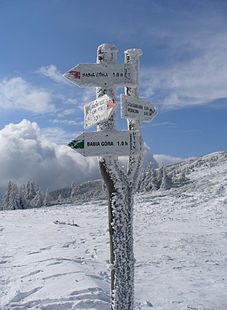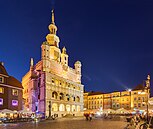
Back بوابة:بولندا Arabic Portal:Polşa Azerbaijani Портал:Полша Bulgarian دەروازە:پۆڵەندا CKB Portál:Polsko Czech Portal:Polen German Portal:Polonya DIQ Πύλη:Πολωνία Greek Portalo:Pollando Esperanto Portal:Polonia Spanish
Welcome to the Poland Portal — Witaj w Portalu o Polsce

 Poland is a country in Central Europe, bordered by Germany to the west, the Czech Republic to the southwest, Slovakia to the south, Ukraine and Belarus to the east, Lithuania to the northeast, and the Baltic Sea and Russia's Kaliningrad Oblast to the north. It is an ancient nation whose history as a state began near the middle of the 10th century. Its golden age occurred in the 16th century when it united with the Grand Duchy of Lithuania to form the Polish–Lithuanian Commonwealth. During the following century, the strengthening of the gentry and internal disorders weakened the nation. In a series of agreements in the late 18th century, Russia, Prussia and Austria partitioned Poland amongst themselves. It regained independence as the Second Polish Republic in the aftermath of World War I only to lose it again when it was occupied by Nazi Germany and the Soviet Union in World War II. The nation lost over six million citizens in the war, following which it emerged as the communist Polish People's Republic under strong Soviet influence within the Eastern Bloc. A westward border shift followed by forced population transfers after the war turned a once multiethnic country into a mostly homogeneous nation state. Labor turmoil in 1980 led to the formation of the independent trade union called Solidarity (Solidarność) that over time became a political force which by 1990 had swept parliamentary elections and the presidency. A shock therapy program during the early 1990s enabled the country to transform its economy into one of the most robust in Central Europe. With its transformation to a democratic, market-oriented country completed, Poland joined NATO in 1999 and the European Union in 2004, but has experienced a constitutional crisis and democratic backsliding since 2015.
Poland is a country in Central Europe, bordered by Germany to the west, the Czech Republic to the southwest, Slovakia to the south, Ukraine and Belarus to the east, Lithuania to the northeast, and the Baltic Sea and Russia's Kaliningrad Oblast to the north. It is an ancient nation whose history as a state began near the middle of the 10th century. Its golden age occurred in the 16th century when it united with the Grand Duchy of Lithuania to form the Polish–Lithuanian Commonwealth. During the following century, the strengthening of the gentry and internal disorders weakened the nation. In a series of agreements in the late 18th century, Russia, Prussia and Austria partitioned Poland amongst themselves. It regained independence as the Second Polish Republic in the aftermath of World War I only to lose it again when it was occupied by Nazi Germany and the Soviet Union in World War II. The nation lost over six million citizens in the war, following which it emerged as the communist Polish People's Republic under strong Soviet influence within the Eastern Bloc. A westward border shift followed by forced population transfers after the war turned a once multiethnic country into a mostly homogeneous nation state. Labor turmoil in 1980 led to the formation of the independent trade union called Solidarity (Solidarność) that over time became a political force which by 1990 had swept parliamentary elections and the presidency. A shock therapy program during the early 1990s enabled the country to transform its economy into one of the most robust in Central Europe. With its transformation to a democratic, market-oriented country completed, Poland joined NATO in 1999 and the European Union in 2004, but has experienced a constitutional crisis and democratic backsliding since 2015.
From Polish history –
Selected image –

Did you know –
- ... that the Medieval Town of Toruń (pictured), one of the World Heritage Sites in Poland, is recognized as an excellent example of a European medieval town?
- ... that King Vladislaus I of Poland took advantage of the Teutonic Siege of Medvėgalis in Samogitia to attack Kulmerland?
- ... that the Sikorski Memorial in Gibraltar commemorates the death of General Władysław Sikorski in a 1943 air crash?
- ... that Krzysztof Meyer's opera Cyberiada is based on a series of humorous science fiction stories by Stanisław Lem?
You can help!
Selected biography –
Selected location –
Poland now
Recent events
- On 9 July, Jerzy Stuhr (pictured), a prominent theatre and film actor and director, died at the age of 77.
- Poland at the 2024 European Athletics Championships:






- On 10 June, Natalia Kaczmarek won a gold medal in 400-meter dash.
- On 9 June, Wojciech Nowicki won a gold medal in hammer throw.
- On 9 June, the ruling Civic Coalition won the European Parliament election in Poland.
- On 8 June, Polish tennis player Iga Świątek won the 2024 French Open, her fifth Grand Slam singles title.
Ongoing
Constitutional crisis • Belarus–EU border crisis • Ukrainian refugee crisis • Polish farmers' protests
Holidays and observances in July 2024
(statutory public holidays in bold)
- Battle of Grunwald anniversary (reenactors pictured), 15 July
Subcategories
Topics
Related portals
| Belarus | Czech Republic | Germany | Lithuania | Russia | Slovakia | Ukraine |
| Europe | Catholicism | Communism | European Union |
Associated Wikimedia
The following Wikimedia Foundation sister projects provide more on this subject:
-
Commons
Free media repository -
Wikibooks
Free textbooks and manuals -
Wikidata
Free knowledge base -
Wikinews
Free-content news -
Wikiquote
Collection of quotations -
Wikisource
Free-content library -
Wikiversity
Free learning tools -
Wikivoyage
Free travel guide -
Wiktionary
Dictionary and thesaurus
Wikipedias in the languages of Poland
| Kaszëbskô Wikipedijô Kashubian Wikipedia |
Polska Wikipedia Polish Wikipedia |
Ślůnsko Wikipedyjo Silesian Wikipedia |
Wymysiöeryś Wikipedyj Vilamovian Wikipedia Incubator |
Беларуская • Česky • Deutsch • Հայերեն • Lietuvių • Romani • Русский • Slovenčina • Українська • ייִדיש
© MMXXIII Rich X Search. We shall prevail. All rights reserved. Rich X Search





























